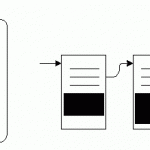/* Structure for a linked list*/ struct list{ Â Â Â int num; Â Â Â struct list* next; /* pointer to next node in list*/ }; /* Function to find the middle node for the linked list, given the starting node pointer*/ struct list* middle(struct list* head) {
Linux Sample Programs
Program to find the middle of a linked list
August 29th, 2009 | by Amit Sahrawat | published in Amit Sahrawat, Data Structures, Linux Sample Programs
Program to remove duplicates from a linked list
August 29th, 2009 | by Amit Sahrawat | published in Amit Sahrawat, Data Structures, Linux Sample Programs
/* Structure for a linked list*/ struct list{ Â Â Â int num; Â Â Â struct list* next; /* pointer to next node in list*/ }; #define FREE(x) free(x);x=NULL; /* Function to remove duplicates from a linked list, given the head pointer for the list*/ void removeDuplicates(struct list** head) {
Program to split a linked list from a given position
August 29th, 2009 | by Amit Sahrawat | published in Amit Sahrawat, Data Structures, Linux Sample Programs
/* Structure for a linked list*/ struct list{ Â Â Â int num; Â Â Â struct list* next; /* pointer to next node in list*/ }; /* Function to split a linked list into two parts, given the position from which to start splitting*/ void split(struct list* head, struct list** dest, int position) {
Program to delete a node from a linked list
August 29th, 2009 | by Amit Sahrawat | published in Amit Sahrawat, Data Structures, Linux Sample Programs
/* Structure for a linked list*/ struct list{ Â Â Â int num; Â Â Â struct list* next; /* pointer to next node in list*/ }; #define FREE(x) free(x);x=NULL; /* Function to delete a node from a linked list, given the value for the node*/ int delete(struct list** head, int value) {
Program to find length of linked list using Recursion
August 29th, 2009 | by Amit Sahrawat | published in Amit Sahrawat, Data Structures, Linux Sample Programs
/* Structure for a linked list*/ struct list{ Â Â Â int num; Â Â Â struct list* next; /* pointer to next node in list*/ }; /* Function to find the length of linked list using recursion, given the starting node pointer*/ int length(struct list* node) {
Program to print linked list in reverse order using Recursion
August 29th, 2009 | by Amit Sahrawat | published in Amit Sahrawat, Data Structures, Linux Sample Programs
/* Structure for a linked list*/ struct list{ Â Â Â int num; Â Â Â struct list* next; /* pointer to next node in list*/ }; /* Function to print data in reverse order for a linked list, given the starting node pointer*/ void reverseprint(struct list* node) {
Program to traverse the linked list
August 29th, 2009 | by Amit Sahrawat | published in Amit Sahrawat, Data Structures, Linux Sample Programs
/* Structure for a linked list*/ struct list{ Â Â Â int num; Â Â Â struct list* next; /* pointer to next node in list*/ }; /* Function to traverse the linked list given the starting node pointer */ void traverse(struct list* node) {
Program to insert a node in the linked list
August 29th, 2009 | by Amit Sahrawat | published in Amit Sahrawat, Data Structures, Linux Sample Programs
/* Structure for a linked list*/ struct list{ Â Â Â int num; Â Â Â struct list* next; /* pointer to next node in list*/ }; /* Function to insert node into a linked list, given the head pointer and the value to be inserted */ void insert(struct list **head,int value) {
Concept of Memory Management using Memory Pools
August 1st, 2009 | by Amit Sahrawat | published in Amit Sahrawat, Linux Sample Programs, Technology
Program to write ‘printf’
May 16th, 2009 | by Amit Sahrawat | published in Linux Sample Programs
#include <stdio.h> #include <stdarg.h> /* minprintf: minimal printf with variable argument list */ void minprintf(char *fmt, …) { va_list ap; /* points to each unnamed arg in turn */ char *p, *sval; int ival; double dval; va_start(ap, fmt); /* make ap point to 1st unnamed arg */ for (p = fmt; *p; p++) { if […]

